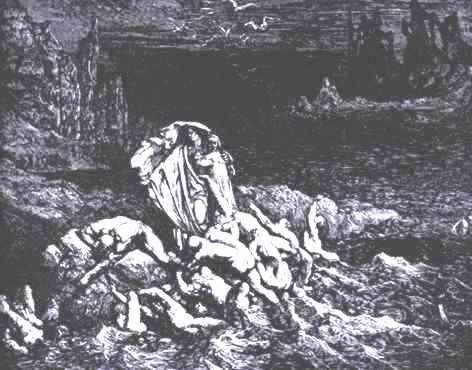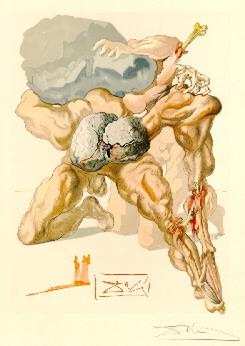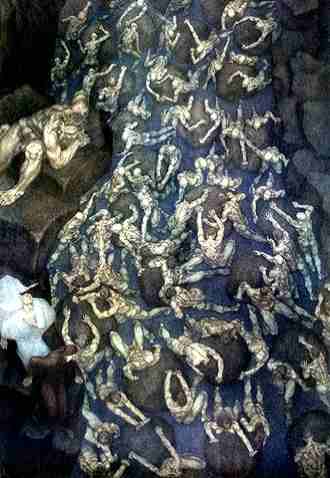 |
 |
 |
|
|
|
|
 |
 |
 |
|
|
|
|
| INF07 |
|
| ........... | ....... G.GUAITA |
................................. H.W.LONGFELLOW |
...... .D.ALIGHIERI |
....... ... | ....... |
| 1
|
"Papé
Satàn, papé Satan alèppe!". al crìa 'l Plùto cun vus d'anrabià; e cul om tant gentìl che tüt al sa, |
"Pape
Satan, Pape Satan, Aleppe!" Thus Plutus with his clucking voice began; And that benignant Sage, who all things knew, Said,
to encourage me: "Let not thy fear Then
he turned round unto that bloated lip, |
«Pape
Satàn, pape Satàn aleppe!»,
cominciò Pluto con la voce chioccia; e quel savio gentil, che tutto seppe, |
| 4
|
par
cunfurtèmi 'm dis: "Sagrìnti nén,
ti àbia nén pagüra; al pöl criè ma a nuj an gà 'nsün 'd pudéj pasè". |
disse
per confortarmi: «Non ti noccia la tua paura; ché, poder ch'elli abbia, non ci torrà lo scender questa roccia». |
|
| 7
|
E
a cul che par la ràbia l'éra viòla
ai dis: "Fa cùcia lì, o lüv ravàs; tén la to ràbia 'ndrén, sta pàzi e tas; |
Poi
si rivolse a quella 'nfiata labbia, e disse: «Taci, maladetto lupo! consuma dentro te con la tua rabbia. |
|
| 10
|
l'è
nén sénsa razòn che i sùma chi;
as völ cuzì, sü 'n cél, 'ndùa 'l Michél l'è fat giüstìsia dla süpèrbia düra". |
Not
causeless is this journey to the abyss; Thus is it willed on high, where Michael wrought Vengeance upon the proud adultery." Even
as the sails inflated by the wind Thus
we descended into the fourth chasm, |
Non è sanza cagion l'andare al cupo: vuolsi ne l'alto, là dove Michele fé la vendetta del superbo strupo». |
| 13
|
Cuzì
la bèstia alùra a l'è zgunfiài
mè i véli di na nav dan sübit giü se l'èrbu la tampèsta l'ha rumpü'. |
Quali
dal vento le gonfiate vele caggiono avvolte, poi che l'alber fiacca, tal cadde a terra la fiera crudele. |
|
| 16
|
Calùma
adès abàs 'ntla quàrta val
che l'è pü làrga e püsè spàsi pìja dla bögia che rabàja tüt al mal. |
Così
scendemmo ne la quarta lacca pigliando più de la dolente ripa che 'l mal de l'universo tutto insacca. |
|
| 19
|
O
giüstìsia di Dìu , an cùla fòsa
quànti pén'i e dulùr t'è radünà! Parchè 's fùma tant mal par cùlpa nòsa? |
Justice
of God, ah! who heaps up so many New toils and sufferings as I beheld? And why doth our transgression waste us so? As
doth the billow there upon Charybdis, Here
saw I people, more than elsewhere, many, |
Ahi
giustizia di Dio! tante chi stipa nove travaglie e pene quant'io viddi? e perché nostra colpa sì ne scipa? |
| 22
|
Mè
che a Carìddi i òndi i fan tampèsta
e sa scòntru tra 'd lur cun gran ciadèl, cuzì ié gént che chi la dév balè. |
Come
fa l'onda là sovra Cariddi, che si frange con quella in cui s'intoppa, così convien che qui la gente riddi. |
|
| 25
|
Chi
tànta gént iù vist mè prìma maj,
che di na part e dl 'àuta, cun ia stòmi, sa sfòrsu 'd rüzè pé e i crìu fort. |
Qui
vid'i' gente più ch'altrove troppa, e d'una parte e d'altra, con grand'urli, voltando pesi per forza di poppa. |
|
| 28
|
Sémp
lur sa scòntru antal medézim post, e prìma 'd girè 'ndré e mustrè i talòn, as crìu:"O brüt starcèr","Tas ti sgaròn!" |
They
clashed together, and then at that point Each one turned backward, rolling retrograde, Crying, "Why keepest?" and, "Why squanderest thou?" Thus
they returned along the lurid circle Then
each, when he arrived there, wheeled about |
Percoteansi
'ncontro; e poscia pur lì si rivolgea ciascun, voltando a retro, gridando: «Perché tieni?» e «Perché burli?». |
| 31
|
Pö
's gìru e i tùrnu 'ndré 'n cul
ària
scüria, par rivè èsi a tir da l'àuta part e dìsi di brüt nom ed èsi uféis; |
Così
tornavan per lo cerchio tetro da ogne mano a l'opposito punto, gridandosi anche loro ontoso metro; |
|
| 34
|
e
rivà là, i fan n'àuta giravòlta
par afruntèsi 'ncù 'mè i füisu 'n giòstra. E mi che iàva 'n cör na gran pagüra, |
poi
si volgea ciascun, quand'era giunto, per lo suo mezzo cerchio a l'altra giostra. E io, ch'avea lo cor quasi compunto, |
|
| 37
|
ai
dis: "Maè, vénta ta ma spiéghi
che gént a l'è che sta a la nòsa snìstra; cùsti dla cirigà, ién tüti préivi? " |
Exclaimed:
"My Master, now declare to me What people these are, and if all were clerks, These shaven crowns upon the left of us." And
he to me: "All of them were asquint Clearly
enough their voices bark it forth, |
dissi:
«Maestro mio, or mi dimostra che gente è questa, e se tutti fuor cherci questi chercuti a la sinistra nostra». |
| 40
|
E
lü : "Iàn avü tüti sa sturtüra
quànd i éru la sü 'n tèra an prìma vìta: lur spéndi iàn nen savì cun giüsta mzüra. |
Ed
elli a me: «Tutti quanti fuor guerci sì de la mente in la vita primaia, che con misura nullo spendio ferci. |
|
| 43
|
Lu
dìzu cun paròli tàntu ciàri,
quànd che i rìvu a scuntrèsi a metà strà, cùi ch' iàn, a cùli 'd lur, cùlpi cuntràri. |
Assai
la voce lor chiaro l'abbaia quando vegnono a' due punti del cerchio dove colpa contraria li dispaia. |
|
| 46
|
Cuj
ca 't vëdi avéj la cirigà ién tüti préivi e pàpi e cardinài che i àvu l'avarìsia mè incarnà. |
Clerks
those were who no hairy covering Have on the head, and Popes and Cardinals, In whom doth Avarice practise its excess." And
I: "My Master, among such as these And
he to me: "Vain thought thou entertainest; |
Questi
fuor cherci, che non han coperchio piloso al capo, e papi e cardinali, in cui usa avarizia il suo soperchio». |
| 49
|
E
mi: "Maèstru, an mès a sa gént chi
mi cunòsi i duvrìa quaichedün che l'éra di 's brüt vìsi fort macià." |
E
io: «Maestro, tra questi cotali dovre' io ben riconoscere alcuni che furo immondi di cotesti mali». |
|
| 52
|
E
lü :" Rinüncia püra al to pensé:
da viv, al mal e 'l bén iàn scunfundü'? e i dévu donc rastè nén cunusü'. |
Ed
elli a me: «Vano pensiero aduni: la sconoscente vita che i fé sozzi ad ogne conoscenza or li fa bruni. |
|
| 55
|
Lur
sémp sa scòntru par l'eternità;
l' Ültim Dì i surtràn fòra dla tòmba cui man a pügn o cùi cavéj taià. |
Forever
shall they come to these two buttings; These from the sepulchre shall rise again With the fist closed, and these with tresses shorn. Ill
giving and ill keeping the fair world Now
canst thou, Son, behold the transient farce |
In
etterno verranno a li due cozzi: questi resurgeranno del sepulcro col pugno chiuso, e questi coi crin mozzi. |
| 58
|
A
lur 'mal dè' e 'mal téni' a l'è gavà
lonch' iè 'd pü bèl al mond; iù fa rüziè 'd sa rüzia che ti 't vëdi nén chitè. |
Mal
dare e mal tener lo mondo pulcro ha tolto loro, e posti a questa zuffa: qual ella sia, parole non ci appulcro. |
|
| 61
|
Capìsu
dès ch' ién fat di fularà, par ròbi che 'n man ià la Déa furtüna; par cùli , tànta gént 's pìu a patlà; |
Or
puoi, figliuol, veder la corta buffa d'i ben che son commessi a la fortuna, per che l'umana gente si rabbuffa; |
|
| 64
|
ànche
tüt l'or che 's tròva e che 's truvàva
sut la lün'a, 'd si ànimi disprà, pudrìa cuntantèni nànca iün'a". |
For
all the gold that is beneath the moon, Or ever has been, of these weary souls Could never make a single one repose." "Master,"
I said to him, "now tell me also And
he to me: "O creatures imbecile, |
ché
tutto l'oro ch'è sotto la luna e che già fu, di quest'anime stanche non poterebbe farne posare una». |
| 67
|
"Maèstru
- i dis - rispòndmi a sa dumànda: sa furtün'a che dès t'è numinà mè l'è che ai bén dal mond lé la cumànda?" |
«Maestro
mio», diss'io, «or mi dì anche:
questa fortuna di che tu mi tocche, che è, che i ben del mondo ha sì tra branche?». |
|
| 70
|
"Oh
'mè che i séj, as vëd, di gran stulëc'
nén bon da vëdi i ròbi 'mè che i son! Adès atént! e 'mpàra la lesiòn: |
E
quelli a me: «Oh creature sciocche, quanta ignoranza è quella che v'offende! Or vo' che tu mia sentenza ne 'mbocche. |
|
| 73
|
Cul
che cun gran sapiénsa 'l guèrna al mond ,
i Céj a l'ha creà, e a lur par guìda i àngiai l'ha dat cun bèla rispundénsa; |
He
whose omniscience everything transcends The heavens created, and gave who should guide them, That every part to every part may shine, Distributing
the light in equal measure; That
she might change at times the empty treasures |
ÜColui
lo cui saver tutto trascende, fece li cieli e diè lor chi conduce sì ch'ogne parte ad ogne parte splende, |
| 76
|
e
daspartüt an part uguàl iè lùce;
cuzì, 'd cùi bé che i brìlu a i öc' dal mond, Lü cùsta l' è vulì minìstra e dùce: |
distribuendo
igualmente la luce. Similemente a li splendor mondani ordinò general ministra e duce |
|
| 79
|
che
tramüdeisa tüti i bén dla tèra
'da na gént a l'àuta sénsa vardè; e i òmni pròpi niénte i pödu fè. |
che
permutasse a tempo li ben vani di gente in gente e d'uno in altro sangue, oltre la difension d'i senni umani; |
|
| 82
|
Cuzì
na nasiòn mònta e 'n àuta càla
secònd völ al giüdìsi di sa déa che mè 'n sarpént antl' èrba lé sa scond. |
Therefore
one people triumphs, and another Languishes, in pursuance of her judgment, Which hidden is, as in the grass a serpent. Your
knowledge has no counterstand against her; Her
permutations have not any truce; |
per
ch'una gente impera e l'altra langue, seguendo lo giudicio di costei, che è occulto come in erba l'angue. |
| 85
|
E
còntra 'd lé 'l pöl niénte 'l vos
pensé; lé la pruvëd, la giüdica e minìstra; la fa, mè i àuti dèj, al so misté. |
Vostro saver non ha contasto a lei: questa provede, giudica, e persegue suo regno come il loro li altri dèi. |
|
| 88
|
La
chìta maj da fè i so cambiamént;
e ànche sì, iu fa cun tànta prèsa che 'l témp 'd cambiè 't vén dos ant' in mumént. |
Le sue permutazion non hanno triegue; necessità la fa esser veloce; sì spesso vien chi vicenda consegue. |
|
| 91
|
L'è
lé cùla che tüti i bütu 'n crus,
fìn'a cuj che i duvrìu parlèni bén e 'nvéce, da sparlèni i chìtu nén. |
And
this is she who is so crucified Even by those who ought to give her praise, Giving her blame amiss, and bad repute. But
she is blissful, and she hears it not; Let
us descend now unto greater woe; |
Quest'è
colei ch'è tanto posta in croce pur da color che le dovrien dar lode, dandole biasmo a torto e mala voce; |
| 94
|
Ma
lé sta fòra 'd tüt e 's god beàta;
cun i àngiai lé la viv la sü, cunténta, la fa 'l so giöc sémp fòra dla turménta. |
ma
ella s'è beata e ciò non ode: con l'altre prime creature lieta volve sua spera e beata si gode. |
|
| 97
|
Dès
calànd truvùma pü gràndi i pén'i ;
già i tramòntu ia stéili che i muntàvu quànd iù partì; spitè i pudùma pü ". |
Or
discendiamo omai a maggior pieta; già ogne stella cade che saliva quand'io mi mossi, e 'l troppo star si vieta». |
|
| 100
|
Donc
travarsùma 'l sèrc' par l' àuta rìva,
là dzùra a n'àqua che la sort bujénta furmànd na rùza che finìs giü 'ndrénta. |
We
crossed the circle to the other bank, Near to a fount that boils, and pours itself Along a gully that runs out of it. The
water was more sombre far than perse; A marsh
it makes, which has the name of Styx, |
Noi
ricidemmo il cerchio a l'altra riva sovr'una fonte che bolle e riversa per un fossato che da lei deriva. |
| 103
|
L'éra
l'àqua culùr dla carbunìn'a, e nuj marciànd an fiànc a i òdi négri, calùma pr' an santé acidentà. |
L'acqua
era buia assai più che persa; e noi, in compagnia de l'onde bige, intrammo giù per una via diversa. |
|
| 106
|
La
fùrma 'n lac che Stìge l'è ciamà
sa rùza gràma, quànd la rìva bas: ai pé dla spiàgia grìza, a iè 's baciàs". |
In
la palude va c'ha nome Stige questo tristo ruscel, quand'è disceso al piè de le maligne piagge grige. |
|
| 109
|
E
mi ch' ia stàva atént fiàand cun i öc',
iù vist an cul paciòc gént anpautà; e tüti biùt a iéru e sagrinà. |
And
I, who stood intent upon beholding, Saw people mud-besprent in that lagoon, All of them naked and with angry look. They
smote each other not alone with hands, Said
the good Master: "Son, thou now beholdest |
E io, che di mirare stava inteso, vidi genti fangose in quel pantano, ignude tutte, con sembiante offeso. |
| 112
|
E
's batìvu! Nén mèc druvànd i man ,
ma cun la tèsta, cun la stòmi e i pé, s'ciancàndsi vìa la carn a murdacià. |
Queste si percotean non pur con mano, ma con la testa e col petto e coi piedi, troncandosi co' denti a brano a brano. |
|
| 115
|
"Car
fiö, - 'm dis al maèstru - cùsti ién
cuj che, 'ntla ràbia, i razunàvu nén; e n'àuta ròba vénta che mi 't dìza: |
Lo
buon maestro disse: «Figlio, or vedi l'anime di color cui vinse l'ira; e anche vo' che tu per certo credi |
|
| 118
|
sùta
l'àqua, la gént che la respìra
la fa si bùli d'ària che ti 't vëdi; se 't gìri i öc' antùrn, tam pöli crëdi. |
Beneath
the water people are who sigh And make this water bubble at the surface, As the eye tells thee wheresoe'er it turns. Fixed
in the mire they say, 'We sullen were Now
we are sullen in this sable mire.' |
che sotto l'acqua è gente che sospira, e fanno pullular quest'acqua al summo, come l'occhio ti dice, u' che s'aggira. |
| 121
|
Piantà
'ntla pàuta i dìzu:"Disgrasià,
che 'ntl' ària 'ndùa 'l sul am fàva lüm purtàvu andrén ad nuj mac nèbia e füm: |
Fitti
nel limo, dicon: "Tristi fummo ne l'aere dolce che dal sol s'allegra, portando dentro accidioso fummo: |
|
| 124
|
Adès
's pianzùma adòs ant' is paciòc ".
Si paròli, iu cèrcu da dì 'ntéri; ma i rèstu a lur an gùla strangulà". |
or
ci attristiam ne la belletta negra". Quest'inno si gorgoglian ne la strozza, ché dir nol posson con parola integra». |
|
| 127
|
Cuzì
i pasùma da na part a l'àuta, girànd al larg an mès tra 'l süt e 'l mol, e tnénda i öc' 'n si cuj che i màngiu pàuta, |
Thus
we went circling round the filthy fen A great arc 'twixt the dry bank and the swamp, With eyes turned unto those who gorge the mire; Unto the foot of a tower we came at last. |
Così
girammo de la lorda pozza grand'arco tra la ripa secca e 'l mézzo, con li occhi vòlti a chi del fango ingozza. |
| 130 | rivùma ai pé 'd na tur dòpu 'n gir fol. | Venimmo al piè d'una torre al da sezzo. |